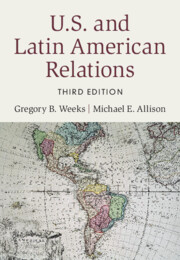Refine search
Actions for selected content:
10 results
7 - Genealogies of Auto-Centered Development
- from Part II - Schools of Thought
-
-
- Book:
- Anticolonialism and Social Thought
- Published online:
- 16 September 2025
- Print publication:
- 25 September 2025, pp 162-185
-
- Chapter
- Export citation
Epilogue
-
- Book:
- Plebeian Consumers
- Published online:
- 18 December 2024
- Print publication:
- 05 December 2024, pp 211-222
-
- Chapter
- Export citation

U.S. and Latin American Relations
-
- Published online:
- 08 December 2022
- Print publication:
- 01 December 2022
-
- Textbook
- Export citation
1 - The Theoretical Context of U.S.–Latin American Relations
-
- Book:
- U.S. and Latin American Relations
- Published online:
- 08 December 2022
- Print publication:
- 01 December 2022, pp 1-16
-
- Chapter
- Export citation
1 - Who Are the Architects of Wakanda?
-
- Book:
- Our Long Walk to Economic Freedom
- Published online:
- 30 August 2022
- Print publication:
- 04 August 2022, pp 6-11
-
- Chapter
- Export citation
Chapter 11 - Latin American Literature and Dependency Theory Today
-
-
- Book:
- After Marx
- Published online:
- 12 March 2022
- Print publication:
- 17 March 2022, pp 176-191
-
- Chapter
- Export citation
Introduction: The Development–Geopolitics Nexus in North Korea
-
- Book:
- North Korea and the Geopolitics of Development
- Published online:
- 10 September 2021
- Print publication:
- 15 April 2021, pp 1-30
-
- Chapter
- Export citation
5 - Africa’s Economy, 1960–2000
-
- Book:
- Africa since Decolonization
- Published online:
- 07 January 2021
- Print publication:
- 21 January 2021, pp 90-115
-
- Chapter
- Export citation
9 - Liberation Theology and Philosophy
-
- Book:
- An Introduction to Latin American Philosophy
- Published online:
- 15 October 2020
- Print publication:
- 05 November 2020, pp 204-230
-
- Chapter
- Export citation
Modernization, dependency, and the global in Mexican critiques of anthropology
-
- Journal:
- Journal of Global History / Volume 9 / Issue 1 / March 2014
- Published online by Cambridge University Press:
- 12 February 2014, pp. 94-121
-
- Article
- Export citation
